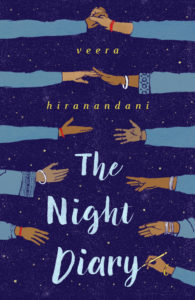I am so happy to be on the blog tour for The Night Diary by Veera Hiranandani. I knew that this book would be emotional, but I don’t think I was prepared for how much this book would move me. I’ve been raving non-stop about it ever since I read it to my entire family. Today I have a mini-review and a Q&A with the author!
Summary
It’s 1947, and India, newly independent of British rule, has been separated into two countries: Pakistan and India. The divide has created much tension between Hindus and Muslims, and hundreds of thousands are killed crossing borders.
Half-Muslim, half-Hindu twelve-year-old Nisha doesn’t know where she belongs, or what her country is anymore. When Papa decides it’s too dangerous to stay in what is now Pakistan, Nisha and her family become refugees and embark first by train but later on foot to reach her new home. The journey is long, difficult, and dangerous, and after losing her mother as a baby, Nisha can’t imagine losing her homeland, too. But even if her country has been ripped apart, Nisha still believes in the possibility of putting herself back together.
Told through Nisha’s letters to her mother, The Night Diary is a heartfelt story of one girl’s search for home, for her own identity…and for a hopeful future.
Review
 (Disclaimer: I received this free book from the publisher. This has not impacted my review which is unbiased and honest.)
(Disclaimer: I received this free book from the publisher. This has not impacted my review which is unbiased and honest.)
This is an intensely emotional story about family, bravery, and migration. Not only are characters touching, but the format of the book is stunning. Nisha is writing letters to her mother who is no longer with their family. Because of this, there is a hopefulness, a vulnerability, and a fierce love that shine through her words. We see this tumultuous and dangerous time in history through the eyes of a child and between each entry our heart stops for a moment.
There are so many wonderful themes and questions. This would make a phenomenal discussion for a younger book club – even for an adult book club. I highly recommend it for every age. There’s a simplicity that strikes you as unrealistic, but also illuminating – why must it be like this? Nisha must make sense not only of her changing role within the family and herself, but also her changing identity as part of the new India. This is a story about bravery, adversity, fear, and confusion. But it’s poignant and deep in a way that is wonderful and absolutely necessary. It feels timely about the dangers of forgetting our humanity in the face of uncertainty of borders and identities.
Q&A
Can you tell me about your inspiration for this book? When did you first come up with the idea for the story?
The inspiration for this book goes way back for me. My father and his family are survivors of the 1947 partition of India. I grew up hearing bits and pieces of his story, how my grandparents started to hear about growing unrest in India and as the date for independence neared, the worry grew. My father and his family had to leave what is now Pakistan and travel by train over the new border into Jodhpur, India. Though they lost their home and beloved community, they arrived safely and were able to start over.
As I grew older, my questions about this family history became more complex. I think I write to try and understand the world better, as many people do. I wanted to understand what happened during this time and what it might have felt like to experience it. I thought about writing a story about Partition for a long time. I would do research, talk to my father, and let the ideas percolate. Then one day a few years ago, I’m not even entirely sure why, I started. It was after I had published other books, and I felt more mature and experienced as a writer. I created a story based on some of my father’s experiences, but also based on what I learned about many other experiences in my research. I then shaped it to explore what I needed to explore.
Food, culture, and identity are often inextricably connected, can you shed light on the ways this is true for the protagonist, Nisha in The Night Diary?
I grew up with a mixed background and was surrounded by both traditional Jewish and Indian foods. I always found food an easy way to feel connected to both sides of my family. Food, in this regard, has been an important part of my identity, so in that way, it was easy to make it an important part of Nisha’s identity, just for different reasons. Nisha is deeply shy and has trouble talking outside of her home. Her close relationship with Kazi, the family cook, is a comforting place for her and making food is a way she can express herself without having to talk. I also find it very satisfying to write about food because I love reading about food. It’s such a natural place to mine for sensory details. So many people find food a place to connect to their culture.
In some ways, The Night Diary is different from your past books, did your writing process change? And how do you think the writing process for both types of books is similar and/or different?
Well, I’ve written another middle-grade novel called The Whole Story of Half a Girl, and a chapter book series, Phoebe G. Green. The Whole Story of Half a Girl was very related to some of my direct experiences and the Phoebe G. Green series came more out of my parenting experiences and the desire to create humorous relatable stories for younger readers centering around food. There’s that food connection again! But yes, for The Night Diary, the subject matter was more challenging, because of the research it required, and the responsibility that comes with writing outside of one’s direct experience even though I feel deeply connected to this part of history. I was also dealing with heavier subject matter, so I wanted to represent the history in a truthful way, but make it appropriate for younger readers. I think children can handle difficult subjects more than we think at times. Often, the mysterious unknown can be more frightening than direct information. So there was more to balance and hold while I was writing this book. But as far as the actual writing process, I just fumbled my way through it just like any story I’ve written!
Author Bio
 Veera Hiranandani earned her MFA in creative writing at Sarah Lawrence College. She is the author of The Whole Story of Half a Girl, which was named a Sydney Taylor Notable Book and a South Asian Book Award Finalist. A former book editor, she now teaches creative writing at Sarah Lawrence College’s Writing Institute and Writopia Lab.
Veera Hiranandani earned her MFA in creative writing at Sarah Lawrence College. She is the author of The Whole Story of Half a Girl, which was named a Sydney Taylor Notable Book and a South Asian Book Award Finalist. A former book editor, she now teaches creative writing at Sarah Lawrence College’s Writing Institute and Writopia Lab.Make sure you check out The Night Diary on Goodreads.
Other Tour Stops
Make sure to check out the other tour stops!
Sounds like a great book. I have to admit I don’t know much about the culture or history of India. It would be great to read this and learn more about it.
It was! Emotional and enlightening
I don’t know anything about this period of history in these countries, so this is going to be also an educational experience for me when I read it. Food is so important to cultures and I do enjoy the character’s connection with cooking as a means of expression.
Yes! I felt like this is a great way to start!
Food is central to our culture, our very sense of being, especially if we regard the kitchen as the heart of the home . This concept though, is rapidly changing as not only have our tastes and experiences become more cosmopolitan, but also, and I worry about this disconnection of the members of the family, our increasing use of individual gadgetry.
Such a great point ^_^ especially about the idea of the kitchen as the heart of the home! FOOD for thought